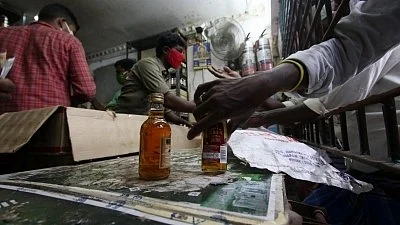Tamil Nadu, a southern state in India, has been grappling with a long-standing problem of illicit alcohol production and distribution. In the latest incident, a hooch tragedy in Villupuram and Chengalpattu districts has once again exposed the grave consequences of the illegal trade.
The consumption of the illicit liquor led to mass casualties, with the death toll rising to 19 on Tuesday, 16 May. The number of deaths due to the hooch tragedy in Marakkanam, Villapuram district, is 14, while in Maduranthakam, Chengalpattu district, the toll stands at 5, DT Next reported.
In a statement released on Monday, Tamil Nadu Director General of Police (DGP) C Sylendra Babu stated that 1,558 persons had been detained in the previous two days and 1,842 cases had been filed in relation to the two incidents. According to latest developments, case relating to deaths due to the consumption of illicit alcohol in the Villupuram and Chengalpattu districts has been transferred to CB-CID.
What Sort of Illegal Liquor Is Circulating in Tamil Nadu?
The police on Tuesday informed that methanol, a deadly concoction made by illicit brewers, is the reason behind the hooch tragedy that struck Ekkiyarkuppam and Perunkaranai villages of Tamil Nadu.
The National Human Rights Commission (NHRC) of India issued a notice that said that illicit liquor that was sold in Tamil Nadu was Arrack, a cocktail of methanol, chemicals, and water.
Typically cheaply produced and containing dangerous substances, such as methanol, which can be lethal when consumed in large quantities, these illicit beverages are produced and distributed clandestinely, evading law enforcement authorities.
According to the police, they have confiscated 19,028 litres of illicit liquor and 16,493 Indian-made foreign liquor (IMFL) bottles from the black market in the last two days. The police have also seized a four-wheeler and seven two-wheelers used to transport such goods, DGP Babu said, adding that 79 people involved in the sale of illicit liquor were booked under the Goondas Act, the Indian Express reported.
The recent twin tragedy comes nearly a month after the Tamil Nadu government in the recent Assembly session said there has been no hooch tragedies in the state in the last 14 years. However, is it true?
Hooch Tragedies in Tamil Nadu
Over the years, Tamil Nadu has witnessed several hooch tragedies, each leaving a trail of devastation in its wake.
Coimbatore Hooch Tragedy (2019): In February 2019, a hooch tragedy struck Coimbatore, leading to the deaths of over 116 people. The illicitly produced and distributed illicit liquid contained toxic substances like isopropyl alcohol, which is an inexpensive solvent used mainly for the manufacturing of cosmetics and lotions.
Tamil Nadu-Karnataka Hooch Tragedy (2008): The infamous 2008 Karnataka-Tamil Nadu alcohol poisoning incident claimed at least 180 lives, according to Outlook India. In May 2008, people from Karnataka and Tamil Nadu consumed moonshine, an illicit liquor made with camphor, tobacco, and toxic methyl alcohol.
Salem Hooch Tragedy (2006): The Salem hooch tragedy occurred in February 2006 in Vazhapadi taluk, about 30 km from Salem. At least four people died and six others, including a woman, were hospitalised, the Times of India reported.
However, these are only some of the many such incidents that has occurred in the state.
TASMAC (Tamil Nadu State Marketing Corporation) is the state-owned enterprise responsible for the wholesale and retail sale of alcoholic beverages in Tamil Nadu. TASMAC, sells 90,000 cases of beer daily and 1,60,000 cases of IMFL (Indian Made Foreign Liquor) which includes all hard alcohol, including whisky, brandy, rum, gin, and vodka.
According to a Crisil poll, the state tops in alcohol use, making for about 13% of the nation's overall alcohol consumption, as per report by The Hindu. However, despite its widespread reach, the TASMAC distribution system has faced criticism for its inability to curb the circulation of illicit alcohol. One key challenge is the extensive network of illicit liquor producers and distributors who operate covertly while wading through the legal repercussions. According to the report, low pay and poor working conditions make way for corruption and malpractice common at the alcohol stores.
What Are The Steps Taken By Tamil Nadu Government?
On 15 May, Chief Minister MK Stalin announced a solatium of 10 lakh rupees from the Chief Minister’s Public Relief Fund to families of the deceased. In a statement, he also made announcements for ensuring medical treatment for those admitted and an assistance of ₹50,000 to each of them. The accused in Chengalpattu hooch incident also received Rs 50,000 for treatment, from CM relief fund, IndiaTVNews reported.
The 1937 Tamil Nadu Prohibition Act includes methanol under its ambit, which is thought to be the primary cause of hooch disasters. To maintain control over the supply of methanol, changes have also been made to the 1959 Tamil Nadu Denatured Spirit, Methyl Alcohol, and Varnish (French Polish) Rules.
Over the years law enforcement agencies have intensified efforts to identify and dismantle illegal distilleries involved in the production of illicit liquor. Raids and arrests have been carried out to disrupt the supply chain of illicit alcohol. However, despite the efforts, the recent hooch tragedy in Tamil Nadu's Villupuram and Chengalpattu serves as a stark reminder of the persistent challenge posed by illicit alcohol production and distribution in the state.
The prevalence of such tragedies and the associated death tolls underscore the urgent need for robust measures to counter this menace. While the government has taken steps to curb the problem, continued efforts, collaboration, and stringent enforcement of regulations are vital to effectively address the issue and safeguard the lives of Tamil Nadu's residents.
(At The Quint, we question everything. Play an active role in shaping our journalism by becoming a member today.)
